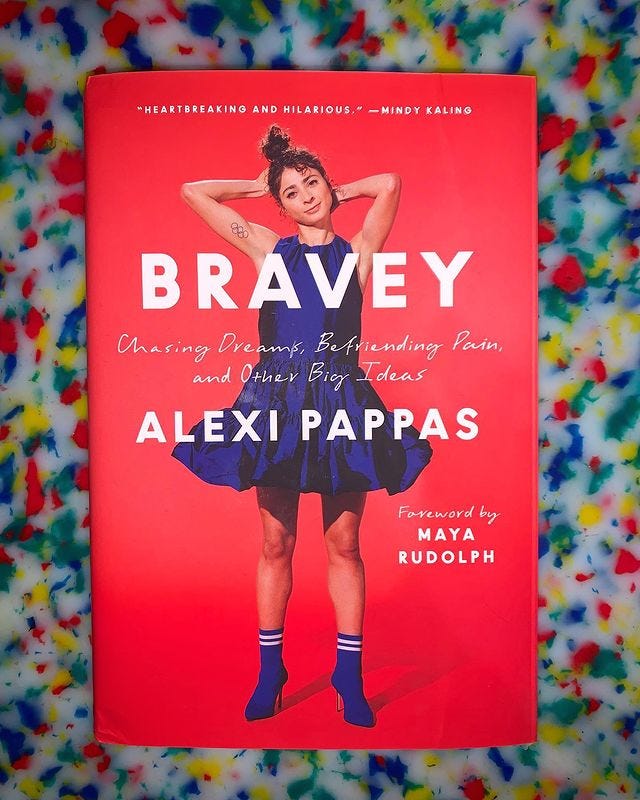Hello,
This week’s issue looks at a new Canadian record, and tries to explain what happened with the viral “Olympics are cancelled!” story when, in fact, the Olympics are not (yet) cancelled.
Thanks, as always, for reading!
Let’s get to it!
Are the Olympics getting cancelled? Not yet, but a single article created a firestorm around this topic this week
The Times in London wrote a piece this week, claiming that the Japanese government “has privately concluded that the Tokyo Olympics will have to be cancelled because of the coronavirus.” They cited an unnamed “senior member of the ruling coalition” as their source.
The article then went on to explain the Games are not yet cancelled, and they are working on contingency plans, including moving forward with the Games in a variety of scenarios.
But the article was behind a paywall and what could be seen publicly seemed pretty absolute. And thus, chaos ensued.
Denials emerged: the Japanese government, the Tokyo Olympic committee, the IOC, and national Olympic bodies all basically said “WTF.”
Devin Heroux at CBC Sports has a good piece about how the ups and downs of discussing cancellation has taken a toll on Canadian athletes and those who support them - and how the Times’ misleading headline and led created a ton of stress:
[Marnie] McBean, a three-time Olympic champion rower, went into full information-gathering mode all while trying to calm the nerves of Canadian athletes who were tweeting and texting and phoning, fearful their Olympic dreams were dashed.
“I wanted to make sure we were getting to athletes before they started going down a rabbit hole of fear, doubt, or sadness.” McBean said. “I knew that we wanted to and needed to get to it quickly because athletes were picking up on this. People are on frayed nerves.”
The Toronto Star has a regular Sunday debate series and this week it tackled the question whether the Olympics can be held safely. On the “yes” side was Canadian IOC member Dick Pound and on the “no” side was University of Ottawa epidemiologist Raywat Deonandan and OISE professor Helen Lenskyj. The crux of their argument, on both sides, is that the Olympics can definitely mitigate the risk involved — but how much risk is worth hosting the biggest sporting event in the world?
From the “Yes” side:
We need to maintain our focus on the objective and not be obsessed by obstacles that can, and will, be overcome.
All of us share an interest in a successful outcome and celebration of Games in Tokyo this Summer. After what will by then have been a disturbing 18 months of existential threat, some good news generated by the youth of the world, gathered in peaceful international competition, will contribute significantly to everyone’s morale. The human spirit is resourceful, resilient, persevering and indomitable.
Sport can, indeed, contribute to the betterment of society. Let’s make sure we give it the chance to do so.
From the “no” side:
The single best way to prevent such variants from arising is to slow transmission maximally until the world achieves herd immunity. This means removing from the table all unnecessary opportunities for infection of large groups.
Our species is in a literal race to immunize the world before the virus mutates an escape from the vaccines. Holding a large in-person international gathering gives COVID-19 a head-start in that race, and can move infection and new variants to the many countries of all the athletes attending. It’s the virus’s best hope for instant global distribution.
In the midst of all this, the six month to the Olympic mark passed and the Tokyo Olympics’ social media accounts marked the occasion as if none of this was happening:
The Games are six months away. Sporting events have happened all over the world since the Olympics were first postponed, to varying degrees of success. A lot can happen between now and July 23.
Discussing the possibility of cancellation is the only responsible thing to do, alongside all other possible contingency plans.
Will the Games indeed happen? It’s too soon to tell.
Calum Neff breaks 20-year-old Canadian 50K record
Calum Neff — the Canadian who lives in Houston who is best know for owning three stroller running world records and recently paced Sara Hall at the Marathon Project — added another record to his long list of accomplishments. Last Sunday, he broke the Canadian 50K road record at a small event he organized in Houston.
Calum ran 50K in 2:51:27 to break the previous record of 2:53:20, which was held by Andy Jones. Jones set that record in the same park Calum ran in, back in 1991.
Calum organized the race himself, which featured about 20 other local runners, with six completing the full 50K. The course was a near-5K figure 8 loop, run 10 times.
Calum knew he was fit when he ran a marathon PB of 2:20:37 while pacing Sara Hall.
“Having seen my marathon time come down, it all just lined up,” Neff told Canadian Running after the race. “After I paced Sara, I knew that day I could’ve gone another five miles and been under record pace.”
The Houston Chronicle had a nice writeup of the achievement (link is behind a paywall):
“Oh heck, that was super special,” Neff said as his voice wavered with emotion. “I’ve done a lot of running, broken records and stuff, but that one just feels like the one I wanted — the one that’s special to me.”
Alexi Pappas’ book Bravey is out, and it’s worth a read
I pre-ordered Alexi Pappas’ memoir, Bravey, from my local bookstore as soon as I heard about it, and finally got to pick it up and read it this week. (You can find a local Canadian bookstore doing delivery or pickup here.)
Alexi is a Greek American runner, who became the first female Greek athlete to run the 10,000m at the Olympics, which she did at the 2016 Games in Rio. She’s now focusing on the marathon, trying to qualify for the 2021 Olympics in Tokyo. She’s also a filmmaker, having made the running movie Tracktown and the Olympic-themed movie Olympic Dreams.
Bravey is a memoir in essays that reflects on Alexi’s life, from a young girl until now. The essays are themed, exploring trauma, the Olympics, puberty, fitting in. Running is a thread through the entire book, as is how Alexi’s mother’s suicide and how that shaped her life. But it’s really a book about growing up and figuring out who you are — and who you want to be.
Her essay about puberty, and how we need to reframe the way we think about it for young athletes, was adapted for the Atlantic.
Alexi has done a of media around the book, and has also opened up about her post-Olympics depression in the process. (She also writes about this in the book.) On Ali on the Run, she focused on her pandemic life and how she balances her art (writing, making movies) with sport. On the Shakeout, she focused on her training and how that’s changed over her career — and how getting locked down for five months in Greece introduced her to an entirely new training approach. On More than Running, she focused on her mental health journey. And on Finding Mastery, she digs into the psychology of it all: what drives her, how trauma has shaped her, and how she finds excellence within herself. Alexi is very open and vert articulate, and if you’re a fan, all three of these interviews are worth listening to.
This Runner’s World piece about Alexi’s friendship with Mary Cain, and how they helped each other and lean on each other through their struggles is also worth a read.
Strides: other stuff to read, listen to and know about
🇨🇦 The 2021 and 2022 Canadian cross-country championships will be held in Ottawa for the first time ever. The 2021 championships are scheduled for Nov. 27.
🌏 American Jim Walmsley attempted to break the 100K world record this past weekend at the Hoka One One's Project Carbon X 2 event in Arizona. He came a heartbreaking 12 seconds short, running 6:09:26. The time is a new American record and the second fastest 100K ever. The race was streamed online, and it was gutsy — at one point, Jim took a turn too tightly and cut his shoulder on a fence.
🎽 Lanni Marchant raced another healthy half-marathon, running 1:13:19 to place sixth at the Las Vegas Gold half-marathon on Sunday. The race was won by American Molly Seidel in 1:09:19, who was racing for the first time for her new sponsor, Puma. (You can read about Molly’s new sponsorship deal at Runner’s World.)
🔨 The Around the Bay 30K is virtual for 2021, but they are offering an opportunity to run all the race distances offered: 2K, 5K, 10K, 15K and 30K. They are calling it “Hammer Time” and it is set to take place March 25-April 25. They are using the medals from 2020 to minimize race. Around the Bay is an iconic Canadian race, and if you’re looking for a spring challenge, this might be it.
🇬🇧 The London Marathon is all set to host a 50,000 person race on Oct. 3. And they are adding a virtual race for 2021, so 50,000 more people can participate — modelled after the virtual edition of the race that took place in 2020.
🎧 Sarah Inglis, the Scottish runner who lives and trains in Canada, shared her story on the Women Run Canada podcast. Sarah holds the Canadian all-comers 5K record. She made her marathon debut at the Marathon Project in December and is now training for the British Olympic marathon trials. In the episode, she talks about moving to Canada at the age of 21, building a training base and community here, moving up the the marathon and what’s next for her.
🎧 Ben Flanagan was a guest on the Morning Shakeout. The episode was a rundown of the top 10 5,000m performances, but he also talked about his pro career, his half-marathon debut and gearing up for the Tokyo Olympics.
📰 The Knowhow newsletter talked to Natasha Wodak about her breakout performance at the Marathon Project, how she’s adapted her training and gotten wiser with age, and how amazing her coach, Lynn Kanuka-Williams, is.
That’s it for this week!
If you’re reading this online or it was forwarded by a friend, you can subscribe here:
Run the North comes out on Monday mornings.
Thanks for sticking with me during these uncertain times. Somehow, there’s always something to write about from the running world.
I’ll see you next week.






